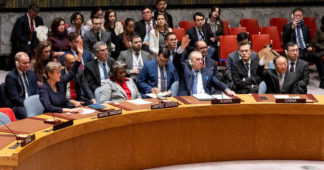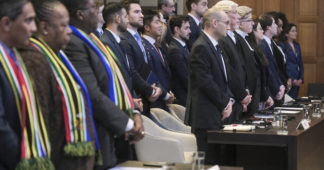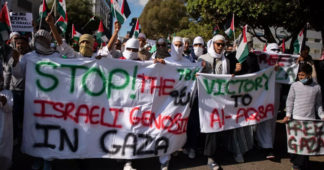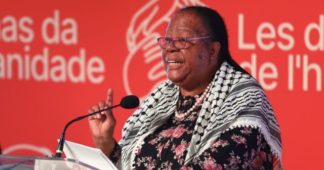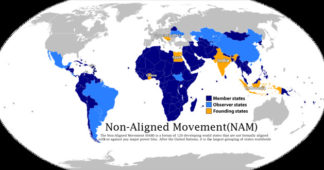By Carlos Cruz Mosquera
Jul 18, 2025
Over 30 delegates from across the Global South convened in Bogotá, Colombia, this week to challenge Israeli impunity. Member states such as Colombia and South Africa ratified resolutions to ban weapons transfers and renew legal action to stop the genocide.
Representatives of more than thirty Global South states gathered in Bogotá, Colombia, this week to set out an emergency plan aimed at halting Israel’s assault on Gaza and the West Bank. Among the resolutions ratified by the group were measures to block the transfer of arms and other military equipment to Israel through their territories and to uphold universal jurisdiction mandates to secure justice for victims of crimes committed by Israel in Palestine.
The conference was convened by the Hague Group, cofounded earlier in the year by officials from several Global South nations, including South Africa and Colombia. The group seeks to ensure the enforcement of rulings issued against Israel by the International Criminal Court (ICC) and International Court of Justice (ICJ).
Its collective effort stands in stark contrast to the posture of the Global North, as the United States and Western European powers, which so often proclaim themselves the leaders of the free and democratic world not only fail to support these measures but actively work to undermine them. Their obstructions have included sanctions on ICC and ICJ officials (most recently against UN representatives such as Francesca Albanese), refusals to cooperate with arrest warrants issued for Israeli officials, and continued military support for Israel.
The old unipolar world is today faltering under the weight of these nations’ barefaced support for Israel’s genocide, while the Southern nations of the formerly colonized — especially states with progressive leaders backed by popular movements — organize for a new one.
Why Colombia?
Convened by Progressive International, the Hague Group was founded in January 2025. “The Hague Group is born of necessity,” said its chair, Varsha Gandikota-Nellutla, at the group’s inauguration. “In a world where powerful nations act with impunity, we must stand together to defend the principles of justice, equality, and human rights.”
Although adopting the name of the European city in which it was founded, the members and steering committee of the group are dominated by Global South actors, with Colombia and South Africa acting as cochair members. South Africa’s dominant role is explained by the fact that its representatives initiated court filings against Israel at the ICJ, spurred on by its own experience of apartheid.
Colombia’s key role, including its hosting of the most recent conference, comes down to the fact that the country’s current government, led by Gustavo Petro, has often led the international condemnation of Israel’s actions, enacting tangible measures against the rogue state.
It is no coincidence that Colombia and Latin American states are helping to lead these efforts to hold Israel accountable for its crimes. The region and its peoples have historically been on the receiving end of violent colonial and imperialist aggressions. As a matter of fact, in the context of the United States’ long-standing interventionism, Israeli military assistance and arms have played an important role in persecuting revolutionary and left-wing movements and their leaders across the region, especially in Colombia.
Israel’s settler colonial violence against Palestinians is something the Global South understands viscerally. Whether it is the more recently inflicted wounds that mark society in countries like South Africa or the scarred-over colonial injuries suffered by Latin Americans — the legacies of which continue to inspire rebellion across these regions — these serve to unite them in a common struggle against historically shared injustices.
In this context, President Petro argues that what Israel and its backers are doing in Gaza is part of a wider “experiment by global powers against the people of the Global South.” The experiment,” he writes, “seeks to demonstrate that the military power of the United States, Europe, and Israel can dominate any rebellion of the world’s poor.”
Widespread Complicity
The attempts to halt the genocidal violence unleashed on Palestinians coincide with Western nations’ efforts to protect and support Israel and those responsible for war crimes. While the United States’ unconditional military support remains the most important for Israel, much of the Western world is also complicit.
Research of investigative journalists from Declassified UK has uncovered that the British government, which claims to be working with Israeli leaders toward a cease-fire, has supported them with a staggering five hundred military intelligence flights over Gaza during the twenty-one months of violence.
Similarly, Germany has maintained that it only supports Israel with defensive military aid despite reports demonstrating that it is used for weapons systems deployed in Gaza, including drones and missiles. In fact, Germany is second only to the United States in exporting major conventional armaments to Israel, and it has been responsible for around 47 percent Israel’s total imports of these, worth a hefty $355.3 million in 2023 alone.
The European Union continues to express its unwavering support for Israel, limiting its softball criticisms to the manner in which the country has handled aid distribution in Gaza. Moreover, recent reports show that EU funding, specifically the Horizon Europe fund, has been channeled toward military operations and developing instruments of war, albeit indirectly.
The widespread diplomatic and tangible support for Israel amid its massacre of Palestinians should not be perceived as a failure of the West’s political leadership, an error of judgement in a complex situation of war. Rather, its resoluteness in aiding and protecting Israel as it commits heinous war crimes should be viewed within the long history of European colonial crimes.
The Hague Group’s Measures and What They Could Mean
Twelve of the states represented at the Hague Group emergency conference — Bolivia, Colombia, Cuba, Indonesia, Iraq, Libya, Malaysia, Namibia, Nicaragua, Oman, Saint Vincent and the Grenadines, and South Africa — committed to observing six measures voted on and passed at the conference.
These include halting the sale of arms and other military equipment to Israel; blocking military vessels from transiting through or docking in their territories; prohibiting their own national vessels from transporting military or dual-use items; launching an immediate review of public contracts that may support the occupation of Palestinian territories; ensuring compliance with obligations to prosecute the most serious crimes under international law; and supporting universal jurisdiction mandates to secure justice for victims of international crimes committed by Israel in Palestine.
How successful these measures will be in the face of the ongoing atrocities, and whether others will join, remains to be seen. Although Israel, with strong support from some world powers, continues to possess the military might to oppress and massacre Palestinians, a significant number of Global South leaders have shown the moral clarity — and, increasingly, the political will — needed to confront Israel’s impunity.
We remind our readers that publication of articles on our site does not mean that we agree with what is written. Our policy is to publish anything which we consider of interest, so as to assist our readers in forming their opinions. Sometimes we even publish articles with which we totally disagree, since we believe it is important for our readers to be informed on as wide a spectrum of views as possible.
